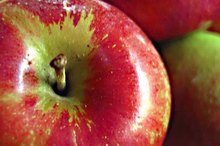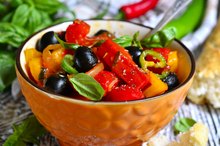The Disadvantages of Food Processing
Unless you live on a farm, it’s unlikely that you eat only unprocessed food. Nearly every food purchased in the grocery store undergoes some type of processing, whether it’s preservative to extend a product’s shelf life, spray to enhance the appearance of a fruit or food coloring to add a more attractive color. Some processing, like pasteurization, has obvious benefits in reducing disease risk, while other have no benefits besides adding higher sodium or sugar content to a product to make it taste better. Around 90 percent of American food money goes to buy processed foods, SixWise states.
Decreased Nutrients
Processed foods lose a good deal of their vitamin content. This also happens with fresh foods unless they’re eaten quickly, but freezing, canning or otherwise altering foods so they keep longer results in nutrient losses. Just growing vegetables and fruits in fertilized soil can reduced the vitamin C content in the final product, the Better Health Channel reports 1. Blanching foods before freezing also removes water-soluble vitamins like B complex and vitamin C. Milling grains removes the husk, which contains most of the vitamins, while peeling fruits and vegetables can also removes vitamins that lie close to the skin’s surface.
- Processed foods lose a good deal of their vitamin content.
- Blanching foods before freezing also removes water-soluble vitamins like B complex and vitamin C. Milling grains removes the husk, which contains most of the vitamins, while peeling fruits and vegetables can also removes vitamins that lie close to the skin’s surface.
Additives
Disadvantages of Irradiated Food
Learn More
Preservatives and additives that enhance flavor and taste rarely add any nutritive value and in some cases, have been implicated in causing cancer or other diseases. Sodium nitrite, for example, gives processed meats such as hot dogs and lunch meat their characteristic pink color and also prevents growth of bacteria that cause botulism. However, nitrites can also form nitrosamines, chemical that may increase the risk of cancer in animals and humans. Artificial food colorings, added for no other purpose than to make food look more appetizing, also have been implicated as possible cancer-causing agents.
- Preservatives and additives that enhance flavor and taste rarely add any nutritive value and in some cases, have been implicated in causing cancer or other diseases.
- Artificial food colorings, added for no other purpose than to make food look more appetizing, also have been implicated as possible cancer-causing agents.
Contamination
Salmonella outbreaks are often traced back to certain manufacturing plants, where contamination with the bacteria can sicken large numbers of people who consume a food product, such as the peanut butter outbreak associated with peanut produced by ConAgra in 2007. Since many processed meats such as hamburger now contain beef from many cows, a single sick cow can contaminate a large amount of processed meat. The Centers for Disease Control and Prevention reported a 50 percent increase in E Coli infections between 2004 and 2007 alone, Food Quality News reported 3.
Added Fats and Sugar
Pros & Cons of Raw Food Diets
Learn More
Processed snack foods, dinners and side dishes almost all contain added sugar, sodium and fats to improve the flavor of dehydrated or frozen meals. All three are associated with major health risks: excess sodium can raise your blood pressure, excess sugar can aggravate diabetes and lead to weight gain and excess fats, particularly trans fats, can increase cholesterol levels and increase the risk of heart disease.
Related Articles
References
Writer Bio
A registered nurse with more than 25 years of experience in oncology, labor/delivery, neonatal intensive care, infertility and ophthalmology, Sharon Perkins has also coauthored and edited numerous health books for the Wiley "Dummies" series. Perkins also has extensive experience working in home health with medically fragile pediatric patients.









